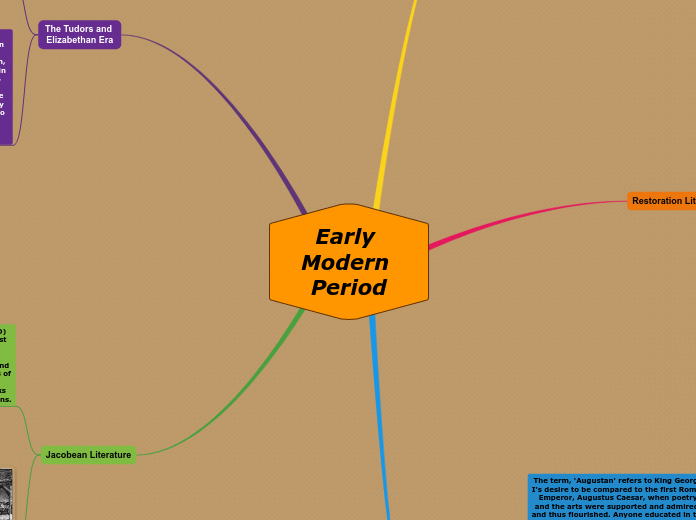Early Modern Period
Caroline and Cromwellian Literature
The Caroline Age has its time span of Charles First during 1625-1649 and the name Charles derived from Latin word ‘Carolus’ which means Charles. After the demise of James First, Charles First appointed as the King in 1625 and in 1649, he was executed as a result of Puritan uprising under the leadership of Oliver Cromwell.
• Of the latter type, Leviathan by Thomas Hobbes would prove to be one of the most important works of British political philosophy
• The period also saw a flourishing of news books, the precursors to the British newspaper, with journalists such as Henry Muddiman, Marchamont Needham, and John Birkenhead
• The two most important poets of Oliver Cromwell's England were Andrew Marvell and John Milton
Restoration Literature
1660 marks the beginning of the Restoration Period. King Charles II came to the throne and monarchy was restored in England. The restoration period brought many changes in the political and social scenario. Catholics were dominated by Anglicans. English literature was written during the restoration period known as English restoration literature. The writers of this age were completely out of moral sense and seriousness. English literature was highly influenced by French literature

Augustan Literature
The term, ‘Augustan' refers to King George I's desire to be compared to the first Roman Emperor, Augustus Caesar, when poetry and the arts were supported and admired, and thus flourished. Anyone educated in the eighteenth century would be familiar with the original texts, since studying the classics was a central feature of the school curriculum.
Eighteenth century Augustan literature emulates the classical style, tending to be polished and shaped according to rules which governed both Roman and Greek works. However, classical works are not just emulated but also parodied during the Augustan period.
The most representative authors of this era are:
• Alexander Pope (21 May 1688 – 30 May 1744), poet
• Jonathan Swift 30 November 1667 – 19 October 1745), essayist
The era also saw the development of the novel by authors such as:
• Daniel Defoe (c.1659 – 24 April 1731), whose Robinson Crusoe (1719) was published in more editions than any other works besides Swift's Gulliver's Travels
• Samuel Richardson, who wrote the sentimental epistolary novels Pamela (1740–41) and Clarissa (1747–48)
• Henry Fielding, who parodied Richardson in his Shamela (1741), and wrote Joseph Andrews (1742) and Tom Jones (1749).
Features of the Augustan period • The dominant tone
• Allusion
• The increase in literacy and printing
• The dominant philosophy
The Augustan Age or, Neoclassical Age | The Age of Reason | Introductory Lesson (Part 1)
The Tudors and Elizabethan Era
The Elizabethan era is the greatest age in the history of English literature. This period reached a remarkable achievement in the genres of poetry, drama, and a variety of prose.
• Important poets in this period were Edmund Spenser and John Milton.
• Important philosophers were Sir Thomas More and Sir Francis Bacon.
• Important playwrights were Christopher Marlowe and William Shakespeare.
The Tudors ruled England during the era when Western Europe moved from the medieval to the early modern, and they instituted changes in government administration, the relationship between crown and people, the image of the monarchy and the way people worshipped. They also oversaw a golden age for English writing and exploration.

Jacobean Literature
Jacobean Era (1603 -1625 A. D) Jacobean era: Lyrical works lost their force and metaphysical poetry began. Metaphysical Poetry that are less beautiful and musical, containing more tricks of style and images to attract attention. Showing clever tricks of style and unlikely comparisons.
Importants writters
• Dramatist Ben Jonson: known as “Rare Ben Jonson” wrote poetry, prose, and drama
• John Lyly author considered to be the first English prose stylist to leave an enduring impression upon the language. As a playwright he also contributed to the development of prose dialogue in English comedy.
• Jacobean Novelists: Robert Greene and Thomas Nash: Picaresque novels (Spain): novels based on adventures (in different places) of men who are wicked but lovable Jacobean novels: little value – started false beginning, and died out

